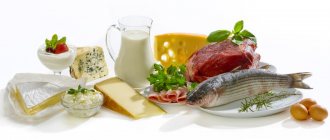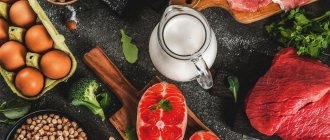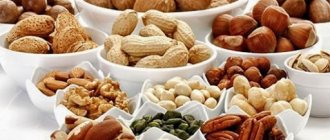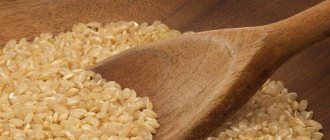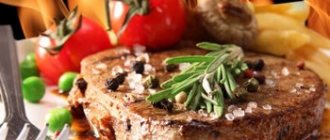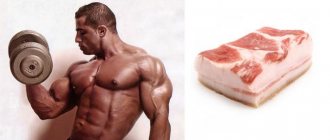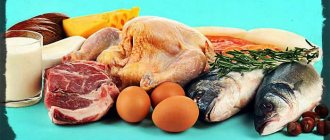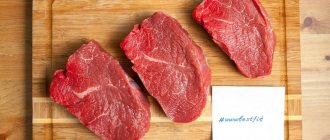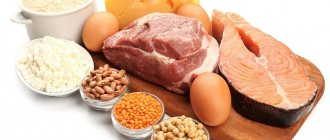Protein is the basis of life. All our muscles are made of it, or rather of amino acids. They form long chains that form a substance called protein. In the human body, protein is intensively consumed. Cells tend to age and break down. Therefore, it is required to receive it with food every day. And then everything is simple. The digestive system breaks it down into amino acids, which are assembled into a new protein molecule. Bodybuilders practice increasing their protein intake. This is important for the formation of muscle mass. Today we’ll talk about what happens if you eat a lot of protein.
Which is healthier: egg white or yolk?
If we talk about caloric content, then, of course, the protein outperforms the yolk, since it contains only 48 kcal per 100 g of product (yolk - 354 kcal). For this reason, protein is recommended for overweight people or those who want to gain muscle mass but burn excess fat. Protein contains the minerals niacin, potassium, riboflavin and magnesium. It is great for making omelettes, soufflés and biscuits, because when it is whipped, the mass begins to foam and increase in volume, which gives the dish an airy feel. But in case of vitamin deficiency or depletion of the body, preference should be given to the yolk. Egg yolks contain a large amount of vitamins - A, B6, B12 and D. In addition, they contain minerals - calcium, folate and omega-3. In general, both the white and yolk contain a large amount of nutrients, so it is best to consume the eggs whole.
https://youtu.be/uy-n8G9KmlM
Eggs are a good source of protein
Eggs are a beneficial product for human health, but they are also considered to be useless because they contain cholesterol. A 100g egg contains about 12g of protein, 10g of fat, 370mg of cholesterol and contains no carbohydrates.
They also contain a large amount of chemicals. Elements (almost the entire periodic table): calcium, potassium, phosphorus, magnesium, sodium, chlorine, sulfur, iron, zinc, iodine, copper, manganese, chromium, fluorine, molybdenum, boron, cobalt
. And vitamins: B1, B2, B3, B6, B9, B12, E, C, D, A, H, PP, K, etc.
Composition and calorie content
- calories – 48 kcal;
- proteins – 11.1 g;
- fats – 0.2 g;
- carbohydrates – 1 g.
Egg white is almost 90% water and 10% protein. In consistency, it is a transparent creamy thick liquid, which, after heat treatment, coagulates and transforms into a white dense substance.
Chemical composition:
- vitamins (PP, NE, full complex of B vitamins);
- macroelements (calcium, magnesium, potassium, sulfur, phosphorus, chlorine, sodium);
- trace elements (iodine, iron, chromium, selenium, copper, molybdenum).
Chemical composition of raw eggs.
The composition of the white and yolk of a chicken egg is given in Table 1:
| Substance | Whole egg | Protein 100 g | Yolk 100 g | Daily requirement |
| Calcium, mg | 55 | 10 | 136 | 1000 (women over 60 years old 1200) |
| Potassium, mg | 140 | 152 | 129 | 2500 |
| Magnesium, mg | 12 | 9 | 15 | 400 |
| Phosphorus, mg | 192 | 27 | 542 | 800 |
| Iron, mg | 2,5 | 0,2 | 6,7 | 10 (men) 18 (women) |
| Vitamin A, mg | 0,25 | footprints | 0,89 | 0,9 |
| Beta-carotene, mcg | 0,06 | 0,21 | 15 | |
| Vitamin D, mcg | 2,2 | 7,7 | 10 (women over 60 years old 15) | |
| Vitamin B1, mg | 0,07 | 0,24 | 1,5 | |
| Vitamin B2, mg | 0,44 | 0,61 | 0,28 | 1,8 |
| Vitamin B6, mg | 0,14 | 0,01 | 0,46 | 2 |
| Vitamin PP, mg | 0,2 | 0,2 | 0,1 | 20 |
| Vitamin B12, mcg | 0,52 | 0,08 | 1,8 | 3 |
| Folacin, mcg | 7,0 | 1,1 | 22,4 | 400 |
| Choline, mg | 251, | 39 | 800 | 500 |
What are the benefits of egg white?
- Supports nervous system health.
Egg whites contain choline. The main task of this vitamin is to ensure and maintain the correct methylation process. This process affects DNA as well as the nervous system. A sufficient level of choline in the body prevents the occurrence of factors that can harm the nervous system. - Contains little cholesterol.
Studies have shown that egg whites contain very little cholesterol (only 186 mg). The product contains a large amount of nutrients with a small amount of cholesterol, so it is safe for people with cardiovascular problems (increased cholesterol levels in the body can lead to a stroke or heart attack). - Good for muscle growth.
In general, athletes need to consume protein regularly and in large quantities. This issue is especially important in the process of building muscle mass. Egg whites are an excellent source of protein, a substance that is the building material of muscle fibers. Therefore, it is recommended to regularly consume egg whites, which will help achieve the desired result much faster. - Supports blood pressure.
To balance high blood pressure, as a rule, experts recommend consuming foods or special medications containing potassium. You can get more than enough potassium from egg whites. This nutrient will not only regulate blood pressure, but also help strengthen bone tissue and reduce the likelihood of stroke. If you have high blood pressure, you should consult your doctor before including egg whites in your diet. - Treats cardiovascular diseases.
By consuming egg whites regularly, you can treat various problems related to the cardiovascular system. For example, protein can affect blood clotting. It contains minerals and vitamins that promote proper blood flow. Egg white can also influence the effectiveness of vasodilation (relaxation of the muscles of the walls of blood vessels), and is involved in the process of dilation of blood vessels. Moreover, the potassium contained in proteins can prevent the occurrence of coronary heart diseases. - Prevents fatigue.
One of the factors causing fatigue is iron deficiency in the body. Therefore, people with chronic fatigue or periodic dizziness are recommended to include egg whites in their daily diet. Magnesium and manganese contained in proteins prevent fatigue. But before you start treating chronic fatigue, you should consult with a specialist to avoid undesirable consequences. - Supports bone health.
The body needs calcium to maintain healthy and strong bones. Egg whites are an excellent source of calcium. It restores bone density and also helps prevent fractures and the development of rickets. - Prevents early aging.
Regular consumption of egg whites also promotes cell and tissue rejuvenation, which leads to skin renewal. Egg whites are a natural source of substances that help fight the signs of premature aging. - Prevents diseases.
Egg whites are a source of vitamins B2 and B12. The body needs them to prevent cataracts, migraines, headaches and back discomfort.
We recommend reading:
what are the benefits of eggshells
Read
The benefits of raw protein
Crude protein has a number of beneficial properties:
- It is perfect for people who want to build muscle mass. For example, some athletes add raw egg whites to protein shakes.
- Raw egg whites can be used instead of certain medications to reduce the acidity of gastric juice.
- Protein is also actively used in the field of cosmetology. With its help, you can get rid of wrinkles and dandruff, strengthen hair and prevent hair loss, and also nourish the skin with useful substances. Many people have probably heard that before the invention of shampoos, some people washed their hair with eggs.
But there is also a flip side to the coin, since the raw product carries some dangers. When eating raw eggs, there is a risk of contracting salmonellosis. Even though sanitary controls are carried out at poultry farms, it is impossible to be sure that there is no salmonella in an egg. Therefore, before breaking an egg, you need to rinse it thoroughly. Sometimes it is even washed with soap.
Benefits of Boiled Protein
Boiled protein is also beneficial for the body. The main advantage of boiled protein is that it is much better absorbed. In addition, it itself is rich in minerals and vitamins. It contains manganese, a trace element that supports the health of the reproductive system and normalizes hormonal metabolism, as well as iron. It normalizes hematopoietic processes and improves blood composition. Boiled protein also contains potassium, which has a beneficial effect on the heart, sodium, which maintains water balance, and calcium, which is responsible for the health and strength of teeth, bones and nails.
Eggs in bodybuilding[edit | edit code]
How to separate whites from yolks
Modern egg production
https://youtu.be/XInV7bKeKH4
Should you store eggs in the refrigerator?
Egg
- This is one of the cheapest and at the same time high-quality sources of protein used in bodybuilding and powerlifting. Whole egg whites have the highest digestibility and are considered the standard against which all other proteins are judged. A chicken egg consists of a protein, which is almost 100% albumin (ovoalbumin), and a yolk, which contains 7 different proteins: albumin, ovoglobulin, coalbumin, ovomucoid, ovomucin, lysocin, avidin.
One chicken egg contains:
- Protein - 6-7 g
- Carbohydrates - 0.5 g
- Fats - 4 g
- Choline (lecithin) – 150 mg
- Vitamins and minerals
Raw eggs[edit | edit code]
Eating large quantities of raw chicken eggs is not recommended, as they contain an inhibitor (a substance that significantly slows down the digestion process) of the digestive enzyme trypsin. Moreover, the avidin peptide contained in the protein blocks vital biotin (vitamin H), forming a strong complex that is not digested or absorbed by the body. Therefore, it is recommended to consume chicken eggs only after heat treatment (at 70°C the trypsin inhibitor is destroyed, and at 80°C active biotin is released from the biotin-avidin complex).
Research[edit | edit code]
- One egg a day can reduce the risk of stroke.[1]
Eggs and cholesterol[edit | edit code]
Japanese and Taiwanese scientists decided to find out the effect of egg white on the human body. Three groups of female volunteers participated in the experiment. All of them were practically healthy, but with elevated cholesterol levels in the blood. The subjects ate diet-prepared food at a rate of 1,750 kilocalories per day with a daily intake of 70 grams of protein. Fat in the subjects' diet accounted for 20 percent of total calories. The first group got 30 percent of their protein from egg whites, the second group from cheese, and the third from soy cheese. Body weight and daily exercise remained constant throughout the study. As it turned out as a result of the experiment, in the groups that received protein from egg whites and soy cheese, the total cholesterol level decreased, and in the first group, in addition, the level of “good” lipoproteins increased. In the second group, which received cheese, their blood cholesterol levels increased.
Should you eat yolks[edit | edit code]
Another study published in the Annals of Nutrition and Metabolism in 1996 found that eating eggs throughout the day lowered levels of high-density lipoprotein, which lowers cholesterol and prevents the development of atherosclerosis. Although at first glance this indicates that eggs are not that healthy, a closer look reveals a simple solution. The negative effects of eating eggs are associated with increased oxidation, which is favored by eating whole eggs due to their high polyunsaturated fat content. Polyunsaturated fats are especially prone to oxidation, including the much-touted omega-3 fats found in fish and flaxseed oil. However, you can easily prevent increased fat oxidation simply by consuming antioxidants. They include vitamins C, E, PP, selenium and beta-carotene. Such natural antioxidants stabilize polyunsaturated fats, preventing oxidation.
This is all theory, but how does it work in practice?
90% of bodybuilding athletes are under 30 years of age and do not have problems with high cholesterol levels in the blood; these factors almost completely eliminate the possibility of pathological changes in fat metabolism, expressed in hypercholesterolemia. In addition, cholesterol is an integral part of cell membranes, and in a growing body, a lack of cholesterol is fraught with inhibition of physical development and other problems. And since bodybuilding primarily involves increasing muscle mass, cholesterol costs will be higher than in the population. In addition, egg yolk is rich in lecithin, a source of essential phospholipids that are involved in the transport of fats, cleanse blood vessels of cholesterol plaques, destroying LDL, and are needed for the production of HDL. As a result, cholesterol unused by cells returns to the liver and the production of new cholesterol decreases. Therefore, eggs not only do not increase the amount of cholesterol in the body, but help reduce it. And most importantly, every bodybuilder should include additional vitamins in his diet. As mentioned above, vitamins A, C and E have pronounced antioxidant properties, which ensure almost complete safety of eating whole eggs. As for fats, when gaining body weight, their amount will not affect the overall results, since their relative content is small. Do not forget that the yolks contain a large amount of vitamins, microelements and bioactive substances.
Thus, it becomes clear that eating whole eggs for bodybuilding is not only not dangerous, but also useful, especially when gaining weight. If you are losing weight, you should give up the yolk, but definitely include protein in your diet.
How to cook eggs[edit | edit code]
Eggs can be hard-boiled or soft-boiled, fried, cooked in an omelet, or added to other dishes. But with powerful heat treatment, most of the beneficial properties of the egg are simply lost, and the boiled yolk is digested in the stomach for about 3 hours. The best way to prepare eggs for bodybuilding is to soft-boil them. It is believed that almost 100% of the nutrients are absorbed from it, and it is digested in about 1.5 hours. Read the cooking recipes.
General conclusion[edit | edit code]
Eggs are one of the healthiest foods in bodybuilding. Try to eat heat-treated eggs - this improves their absorption and also eliminates the risk of salmonellosis. A healthy athlete can consume 6-8 whole chicken eggs per day without risk to health, and the amount of egg white is not limited. If you have high cholesterol levels, skip the yolks.
Egg whites in sports nutrition[edit | edit code]
For the production of nutritional supplements, both whole egg white and separately egg albumin are used. Sports nutrition made on the basis of egg whites is devoid of all the disadvantages of whole eggs, while completely preserving their beneficial qualities, so the latter is considered one of the highest quality and most effective in all respects. Relatively slow absorption makes it possible to consume egg whites while losing weight, without fear of slowing down the weight loss process.
Egg consumption by professional bodybuilders[edit | edit code]
| BODYBUILDER | NUMBER OF EGG WHITES PER WEEK | FAVORITE EGG WHITE DISH |
| Jay Cutler | 170 pcs.(twice a day) | Omelette with low-fat cheese and vegetables |
| Eddie Robinson | 190-240 pcs. | Omelette, hard-boiled egg whites, or oatcakes. Scones recipe: 400 g egg whites, 1 cup oatmeal, 1/2 tsp. cinnamon, 1 tsp. berry jam. Mix everything and put it in the mold. Makes 2 flatbreads |
| Chris Cormier | 170 pcs. There was a time, I was on a crazy diet - 110 egg whites a day (not recommended) | Omelet with low-fat cheese and pieces of beef |
| Dennis Newman | 150 pcs. | Pancakes: Mix 10 egg whites, 1 cup oatmeal and mashed half a banana. Bake in a pancake maker or non-stick frying pan (without oil) |
| Gunther Schlierkamp | 100 pieces. in the off-season, before competitions does not use | Omelet with onions, mushrooms, tomatoes, low-fat cheese and seasonings (pepper, garlic salt, dry parsley, basil) |
| Dorian Yates | 160-170 pcs. | Mixed with oatmeal and bananas |
| Mike Francos | 210 pcs. in the off-season, 560 pcs. before the competition | Oatmeal pancakes: 18 egg whites, 2.5 cups oatmeal, 1 mashed banana, sugar substitute, raisins, a little salt. Mix thoroughly and bake like regular pancakes. Serves 2 |
| Laura Creaval | 40 pcs. | Omelet with low-fat cheese |
Egg whites at night for weight loss
Egg white contains a protein that is involved in the production of the hormone of joy and growth. These hormones support cell renewal processes, tone muscles and improve mood.
Experts do not recommend consuming raw protein at night, since its absorption takes a relatively long time. Moreover, in this case it will not become a stimulator of fat burning processes. Before going to bed, you should eat boiled protein to lose weight. When choosing the serving size of a product, you need to take into account factors such as health status and body weight. Here are some tips on this:
- Eat 2 boiled proteins before bed. This is suitable for people whose body weight ranges from 78–82 kg. The course lasts 7 days, after which a month-long break and repetition is required.
- 1 boiled protein - if you weigh less than 78 kg for a week.
- 1 boiled protein and kefir. A couple of hours before bedtime, you need to consume protein and low-fat kefir (1 glass). The course lasts from 7 days.
- Protein omelette. For 7 days before going to bed, eat an omelet (2 egg whites).
In addition to its direct effect on the weight loss process, protein also has beneficial properties that support the body during weight loss. Egg whites fill the body with essential substances that support its proper functioning.
Recommendations to follow:
- Drink enough water per day (about 2 liters).
- Organize proper nutrition (healthy food and portion sizes).
- Do not eat high-calorie foods.
After finishing a protein diet, you should not suddenly switch from low-calorie foods to high-calorie foods; a gradual change in diet will help to better consolidate the results.
The processes that stimulate fat deposits are actively launched in the evening, and since egg white can prevent this, you should eat it in the evening. To enhance the effect, you can also include citrus fruits in your diet. An important condition is the need to monitor your health status, since if your health worsens or if any side effects occur, the diet must be stopped. If symptoms do not go away after quitting protein, you should consult your doctor.
Video:
why egg white is ideal for muscle growth Expand
Eggs: harmful to health[edit | edit code]
Posted by Dietitian Joel Fuhrman
Modern research has found that high consumption of eggs can lead to diabetes, cardiovascular disease and prostate cancer. Eggs are high in cholesterol, and high cholesterol levels reduce your body's tolerance to glucose and pancreatic function, leading to diabetes and, in people who already have diabetes, leading to premature death. The Physicians' Health Study, for example, documented a 23% increase in mortality rates from eating more than one egg per day. These negative effects were significantly higher in diabetics. A prospective study of healthcare workers found that people who ate more than one egg per week significantly increased their risk of developing diabetes. People who eat more than seven eggs a week increase their risk by 58%. If a person already has diabetes, the mortality rate doubles if the person consumes more than seven eggs per week. Similarly, a Greek study of diabetics reported a fivefold increase in the risk of mortality due to cardiovascular problems in people who ate at least one egg per day.
Eggs are also rich in choline, which, like cholesterol, is present in high concentrations in prostate cancer cells. A 2011 study that followed 27,607 men from 1994 to 2008 found that those who ate two and a half or more eggs per week had an 81% increased risk of prostate cancer compared to men who ate less than half an egg. in Week. A prospective study of health care workers observing egg consumption in 47,896 men confirmed these findings. Men whose choline levels were highest had a 70% increased risk of prostate cancer.
Other studies have found that choline is involved in the growth and development of cancer. For example, in the highly respected US Nurses' Health Study, increased choline was associated with an increased risk of developing colorectal adenoma. A 2012 study identified a link between egg yolk consumption and carotid artery platelet counts in more than twelve hundred people. Platelet development in the blood vessels increased in proportion to the amount of egg yolks consumed. People with the highest egg consumption performed as well as if the study participants were smokers. People who ate the most egg yolks (an average of about four per week) showed two-thirds of the plaque formation in their carotid arteries, which is comparable to smokers who smoked a pack of cigarettes a day for forty years!
One after another, studies continue to show that egg yolks are not as harmless as everyone used to think. In fact, they pose a particular risk for people who are overweight, prediabetic, or diabetic.
Egg white in cosmetology
Homemade egg masks for face and hair based on protein are a budget alternative to expensive store-bought lotions and creams. The best option in this case would be homemade eggs. If you don’t have homemade eggs, you can buy them in the store, but it is important that the product is fresh and of high quality.
Egg white face masks
Before using the masks, the prepared mixture should be applied to the wrist, then wait about 15 minutes. If itching or rash does not appear, we can conclude that the mask is suitable. Such procedures can be done every other day, but after 2 weeks you should take a break for a month.
Classic mask
- Mix protein (1 pc.) with honey (40 g).
- Add wheat or oat flour (1 tsp).
- Apply to face.
- Wait 10 minutes.
- Wash off the mask with warm water.
Rejuvenating and firming mask
- Start beating the whites, gradually adding potato starch (1 tsp).
- If the mass thickens quickly, add a little water.
- Apply to face.
- Wait 10–15 minutes.
- Wash off the mask with warm water.
Protein-lemon mask
- Beat the egg white, add concentrated lemon juice (1 tsp) and oatmeal (1 tsp).
- Apply to face.
- Wait 10-15 minutes.
- Wash off the mask with warm water.
Fruit mask
- Beat the egg white, beat the avocado (1 tsp) until pureed. Mix all ingredients and stir.
- Apply to face.
- Wait 10–15 minutes.
- Wash off the mask with warm water.
Whitening mask
- Chop fresh parsley, sorrel or dill.
- Mix protein with herbs (2 tsp).
- Apply to face.
- Wait 10–15 minutes.
- Wash off the mask with warm water.
Video:
egg face mask recipe Expand
Hair masks
Protein masks should be applied to washed and slightly moistened hair. It is necessary to ensure that the mask does not dry out to a crust, as it will be difficult to wash off from the hair. Masks can be done once a week. The course should not exceed 8–10 procedures in a row.
Revitalizing mask
- Beat egg whites (2 pcs.) into foam.
- Add apple cider vinegar (1 tbsp), glycerin (1 tbsp) and unrefined olive oil (1 tbsp) to the protein mass.
- Apply to hair.
- Wait 20–25 minutes.
- Wash off the mask with warm water.
Smoothing mask
- Beat egg white (1 pc.) into foam.
- Add honey (1 tbsp) and coconut oil (1 tbsp).
- Apply to hair.
- Wait 20–25 minutes.
- Wash off the mask with warm water.
Moisturizing mask
- Beat egg white (1 pc.) into foam.
- Add heavy cream (2 tbsp) and coconut oil (1 tbsp).
- Apply to hair.
- Wait 20–25 minutes.
- Wash off the mask with warm water.
Mask to activate hair growth
- Beat egg white (1 pc.) into foam.
- Add cold water to the yeast (20 g), stir until it becomes a thick paste.
- Mix protein with yeast.
- Apply to hair.
- Wait 20–25 minutes.
- Wash off the mask with warm water.
Video:
egg hair mask Expand
BZHU table - nutritional composition of raw chicken eggs
Eggs are complete sources of microelements and vitamins. Due to its balanced composition, the product is recommended during dieting and heavy physical activity. It is used to increase muscle mass and burn fat deposits.
Healthy eating is very common nowadays. A person can adhere to it for various purposes: someone needs to get rid of excess weight, someone is simply trying to keep themselves in shape, and some, on the contrary, strive to increase muscle mass. Chicken eggs are needed to achieve any of these goals. Protein deserves special attention. Everyone has heard that it is not recommended to overuse the yolk, due to the large amount of cholesterol it contains. With protein, the situation is different: you can eat as much of it as you like, but you still need to know the amount. To do this, it is worth taking into account the calorie content of egg whites and at least approximately guessing how many grams of protein are in one egg.
Egg white is a muscle builder
Those people who are actively involved in bodybuilding and fitness pay great attention to muscle mass. To do this, the body must receive protein in the required amount, which is calculated individually.
There are many foods high in these nutrients, but eggs occupy one of the leading places. To calculate how many grams of protein are in one egg, you need to know the approximate weight of the egg itself. It’s good if it’s available then you can make the most accurate calculations. But if they are not there, then it is worth remembering that on average one egg weighs about 60 grams, of which 20 grams belong to the yolk. But don't assume that by consuming the remaining 20 or 30 grams you can get the same amount of pure protein. It also contains water, so to find out how many grams of protein are in one egg, we need to take into account the nutritional value per hundred grams of the product. So, one hundred grams of egg white contains 11 grams of protein; based on 20-30 grams, you can get only 3-4 grams of pure protein in one egg.
Athletes know that the body absorbs about 30 grams of protein in one meal. Therefore, in order to get the norm necessary for stable muscle growth, you should eat 8 eggs - and only 1 yolk, and the rest is white.
for low calorie diets
In addition to bodybuilders who closely monitor egg whites, many girls eat egg whites. It is not so important for them to know how many grams of protein are in one egg, since they focus on the low content of fats, calories and carbohydrates.
They are perfect for this type of nutrition because they are a natural and healthy product and also contain few calories.
The calorie content of egg white per 100 grams is no more than 48 kcal, and the white of one egg contains about 14 kcal.
This is very little, but eggs are a filling product, so by including them in a low-calorie diet, you can get rid of the constant feeling of hunger without compromising your figure.
To remember how many grams of protein are in one egg, as well as calculate its calorie content, you can use a special table.
It will help avoid confusion and clearly calculate the individual daily requirement of protein obtained from eggs and the number of calories required for each individual.
Healthy nutrition has become very widespread recently, which is used not only by athletes, but also by other people for certain purposes. Some people want to lose weight or build muscle, while others just want to stay in shape with proper nutrition. An indispensable product in achieving these goals is a chicken egg, and especially egg white. It contains many useful components and few calories.
Nutritionists do not recommend overusing chicken egg yolk, because it contains a large amount of cholesterol. But protein receives special attention, but even it must be eaten in moderation.
As you know, this product consists of three components - protein, yolk and shell. Protein is
a transparent liquid mass located around the yolk. Often, athletes and people who adhere to strict diets, on the recommendation of specialists, separate these two components and eat only the yolk mass. Therefore, it is very important for them to know the approximate weight of this product.
It should be noted that bird eggs are usually divided into categories, depending on which their weight characteristics differ. The category of a product is awarded depending on its weight and size back at the poultry farm, and this is what determines the protein content of the product. It is customary to distinguish the following categories:
Harm and contraindications
Protein has virtually no contraindications except for intolerance to the product and in the case of allergic reactions after consuming it.
Symptoms of an egg white allergy
The following symptoms of protein allergy can be identified:
- runny nose, sinus congestion;
- redness, itching, rashes;
- nausea, vomiting, flatulence;
- tearfulness;
- headaches, weakness, poor health.
In some cases, swelling of the larynx may occur, respiratory function may be impaired, or anaphylactic shock may occur.
Fats in 1 egg, raw and boiled
The majority (160 kcal) comes from the yolks - more than 70%. The total fat content of a raw egg is 11%; when boiled, this figure remains virtually unchanged. One piece weighing 50 g contains 5.5 g of fat.
Yolks contain 30 g of fat (per 100 g), while whites have zero fat.
The yolk contains many unsaturated fatty acids. Some of them are linoleic, oleic, and stearic, representing, respectively, the groups of polyunsaturated, monounsaturated and saturated acids. Due to the cholesterol it contains, daily consumption of the product should be limited to 3 pieces.
Conditions and shelf life of egg whites
Raw egg whites should be stored in an airtight container in the refrigerator. Shelf life – no more than 5 days.
Is it possible to freeze
Proteins can also be stored frozen. To do this, you can use a tray with ice, placing one egg white (2 tbsp) in each cell. After hardening, you need to transfer the cubes into a tight sealed plastic bag. When defrosting, leave the product in the refrigerator for 8–12 hours (overnight), while placing it in a bowl filled with cool water.
The effect of heating on the properties of eggs
There is a lot of controversial talk about eggs. Some people believe that they can be harmful, others believe that eggs only provide benefits and no harm. This inconsistency arises because raw eggs and cooked eggs are different products with different properties.
in their raw form they are beneficial, but after heat treatment, especially when we fry, bake or bake, they turn into a less useful, even dangerous product.
In addition to eggs, when frying, heated oil introduces some harmful effects. Moreover, if the smoking point is exceeded when heated, the oil becomes carcinogenic. Keep in mind that the yolk contains fat, and it also changes when heated.
Dangerous:
- Scrambled eggs with sausage, including sausages, sausages, as well as lard, bacon, and ham. These products contain many harmful impurities.
- Frying in butter due to its low smoking point (150 degrees), in beef or pork fat, in margarine, etc.
These dishes contribute to an increase in bad cholesterol and carcinogens.
What can you make from egg whites?
Egg white is used quite widely in the field of cooking. Without his participation, it will not be possible to prepare either meringue or biscuit dough. Whipped egg whites must be present when preparing soufflés and jelly. In addition, protein can be boiled, fried and baked.
What can you replace egg white with?
An excellent substitute for eggs can be fruits - bananas, apples and other fruits that contain pectin. You can make puree from them. Tofu can replace eggs in some cases. In addition, they can be replaced with a mixture of flaxseeds and water brought to a homogeneous state. To replace egg whites, a mixture of agar-agar (powder) and water or oil is sometimes used. In baking, yogurt is sometimes used instead of eggs.
Effect on the human body
Despite the enormous benefits, some people are not recommended to eat chicken eggs. Usually associated with individual intolerance to the product. In some cases, the product simply should not be abused, while in other cases it is completely excluded from the diet. If you are too keen on eating eggs
, after a while it will be possible to talk about:
- elevated cholesterol levels;
- copious secretion of bile;
- improper functioning of the gastrointestinal tract.
- presence of diathesis;
- urolithiasis;
- weak liver;
- diseases of the circulatory system, such as hepatitis, jaundice, etc.
If you cannot use chicken eggs in your diet, then quail eggs can be an alternative. They are quite small and are completely absorbed by the body.
Since childhood, everyone has known about the benefits of chicken eggs and the fact that they are a natural protein, but this is where the knowledge of many ends. To eat healthy and healthy, it is important to know about the specific benefits and disadvantages of this valuable product. The article will be useful to everyone, especially for those who monitor the amount of proteins, fats, and carbohydrates in their diet.
How to separate the white from the yolk in a raw egg
Methods for separating the white from the yolk:
- Gently tap the shell with a knife over the saucer, slightly splitting the egg in half. Almost all the protein will spill into the saucer. After this, you need to transfer the yolk between the shell halves several times so that all the whites drain.
- Roll a cone-shaped funnel out of paper and place the narrow part of it in a glass. Break the egg into this funnel. The white will flow into the hole, but the yolk will remain.
- Pierce the egg with a needle on both sides. Press your lips to one of the two holes and blow out the white.
- Break the egg into a saucer and then remove the yolk with your hands.
Video:
how to separate an egg into yolk and white Expand
https://youtu.be/-sQJTwD2BvE
Raw eggs - benefit or harm: Benefits of raw yolks.
Raw yolk is healthier than boiled one, because... contains a balanced natural composition of all substances that are beneficial to us. Yolks are rich:
- Vitamin D, which is especially needed for those who work without sunlight.
- Lecithin, which dissolves plaques on the walls of blood vessels, improves brain function and prevents heart attack and stroke, and heals the liver.
- Lutein, which improves vision.
- Choline, which supports lipid metabolism, nerves, brain and liver.
- Biotin, necessary for normal metabolism, healthy skin, hair and immune system.
- Folic acid, without which the hematopoietic system is impossible.
- Iodine, iron, phosphorus, selenium, B vitamins. The yolks even contain vitamin B12, which is so often lacking in those who have a plant-based diet.
- The yolk also contains healthy cholesterol. And we already know that its presence does not worsen, but rather improves our health: Firstly, when we get cholesterol from external sources, our liver will have to work less to create it, so it can use more of its resources to synthesize other necessary substances or for blood cleansing. Secondly, without cholesterol the production of sex hormones is impossible. It is because of its lack that people who switch to a plant-based diet and abandon animal products become weak in relationships with the opposite sex. Men lose their virility and women become frigid.
How to beat egg whites into thick foam
To achieve the ideal consistency, in addition to proteins (4 pcs.), you should also use sugar (1 cup). The whipping procedure can be done with a mixer, blender, whisk or regular fork. Here's how to do it:
- First, add salt (one pinch) to the whites in a bowl.
- When using a blender, start the beating process at low speed.
- When the protein takes on a lighter shade, its volume increases slightly, bubbles appear on it, start adding sugar little by little. You need to pour it in a thin stream or add 1 tsp. during the beating process.
- When all the sugar has been poured out, increase the whipping speed. On average, beat the whites for 10 minutes. It is important not to overcook the product, otherwise it will turn into a dense mass and become glossy.
Egg whites can be considered whipped if the resulting mass easily adheres to the whisk, will not spread and can maintain its desired shape.
Why don't egg whites whip?
Reasons why egg whites don't whip:
- Stale or overly fresh eggs. Egg white from a two-week old egg will not work as it will be too thick.
- Presence of yolk. One small drop is enough to prevent the whites from reaching the desired consistency.
- Incorrect temperature. Some people recommend beating chilled egg whites. This is not entirely correct, since the consistency will be too dense and poorly saturated with air. The mixture needs to be at room temperature.
- Dirty or damp container. The container in which the egg whites are beaten should not be wet or greasy.
- Water entering the mixture during the beating process.
- Early addition of sugar.
- Incorrectly calculated amount of sugar (too much or too little).
Video:
how to beat egg whites into a thick foam with a mixer Expand
How to use
- Egg white is considered the most popular in cooking.
- Due to the list of beneficial properties, this product can be consumed raw. This is done on an empty stomach
. In this case, the protein coats the walls of the stomach and promotes the healing of ulcers. - In addition, the protein is actively boiled and fried. This dish is common in many families as one of the possible options for a quick breakfast.
- Proteins are often used for preparing second courses, and less often for first courses. Not very long ago, the fashion came from Transcaucasia to prepare soups using these products.
- Used as a base for creams and baking dough.
Advice! In order for the whites to whip better into foam, they need to be cooled. It will also help if you add a pinch of salt to the bowl.
Amount of protein depending on cooking method
The method of preparing chicken eggs affects the amount of protein in it:
- raw – up to 12.7 g;
- boiled – up to 12.7 g;
- fried (without oil) – about 14.5 g;
- in an omelet – 11 g.
An egg white (without the yolk) contains from 2.6 to more than 5.6 g of protein. The highest digestibility is from soft-boiled eggs. For comparison, below are several more cooking methods with a change in the amount of protein (upper limit):
- melange – 12.7 g;
- dry protein – 82.4 g;
- dry yolk – 31.1 g;
- egg powder – 46 g.

